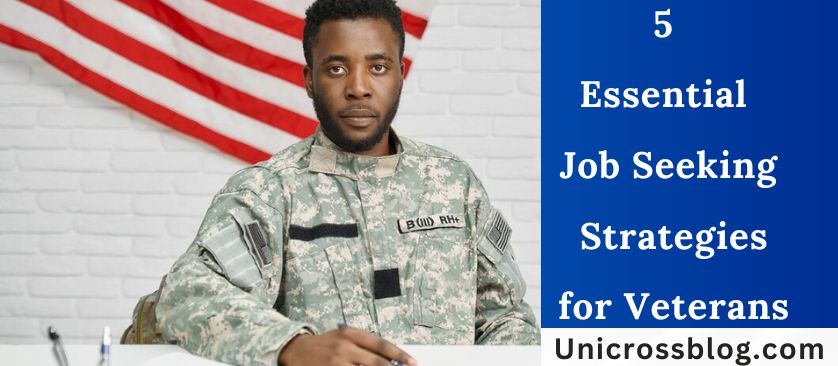Transitioning to civilian life as a veteran can feel daunting. You have developed valuable skills and leadership experience during your military service, but translating those abilities to the civilian workforce comes with unique challenges.
Fortunately, there are proven strategies to help you navigate this process successfully. By leveraging your military background and adopting targeted job-seeking techniques, you can position yourself as a top candidate in today’s competitive job market.
This article outlines five essential strategies to help you stand out from other applicants, effectively communicate your value to employers, and land the civilian career you desire. With the right approach, you’ll be well-equipped to take your next professional step with confidence.

5 Essential Job Seeking Strategies for Veterans
As a veteran transitioning to civilian life, you possess a unique set of skills and experiences that can be invaluable in the job market. However, navigating the civilian job search process can be challenging. Here are five essential strategies to help you succeed in your job search and land the career you desire.
1. Translate Your Military Experience
One of the most crucial steps in your job search is effectively translating your military experience into civilian terms. Many employers may not fully understand military jargon or the significance of your roles and responsibilities. To bridge this gap:
- Examine your military occupational specialty (MOS) and identify the corresponding civilian job equivalents.
- Focus on transferable skills such as leadership, teamwork, problem-solving, and adaptability.
- Use civilian terminology to describe your accomplishments and responsibilities.
- Quantify your achievements whenever possible (e.g., “Led a team of 50 personnel” or “Managed a $2 million budget”).
By clearly communicating your skills and experiences in terms that civilian employers can understand, you’ll significantly increase your chances of landing interviews and job offers.
2. Leverage Veteran-Specific Resources
As a veteran, you have access to numerous resources designed specifically to assist you in your job search. Take full advantage of these opportunities:
- Utilize the Transition Assistance Program (TAP) offered by the Department of Defense.
- Explore job search platforms tailored for veterans, such as Hire Heroes USA and Military.com.
- Connect with veteran service organizations like the American Legion or Veterans of Foreign Wars for networking and support.
- Investigate education and training programs offered through the GI Bill to enhance your skills and qualifications.
These resources can provide valuable guidance, training, and connections to help you navigate the civilian job market more effectively.
3. Network Strategically
Networking is a critical component of any successful job search, and as a veteran, you have a built-in network of fellow service members and veterans. To maximize your networking efforts:
- Attend job fairs and events specifically designed for veterans.
- Join professional associations related to your desired career field.
- Utilize social media platforms, particularly LinkedIn, to connect with other veterans and potential employers.
- Reach out to veterans who have successfully transitioned to civilian careers for advice and mentorship.
Remember, many companies actively seek to hire veterans, so networking can help you uncover these opportunities and gain valuable insights into various industries and roles.
4. Tailor Your Resume and Cover Letter
Your resume and cover letter are often your first opportunity to make an impression on potential employers. To stand out:
- Customize your resume for each job application, highlighting the skills and experiences most relevant to the position.
- Use a civilian-friendly format that emphasizes your accomplishments and transferable skills.
- Include a summary statement that clearly communicates your value proposition as a veteran.
- In your cover letter, explain how your military experience has prepared you for the specific role you’re applying for.
- Consider including a separate section highlighting your military awards, certifications, and security clearances if relevant to the position.
By tailoring your application materials, you’ll demonstrate to employers that you’ve thoughtfully considered how your military background aligns with their needs.
5. Prepare for Civilian Interviews
Interviewing in the civilian world can be quite different from what you experienced in the military. To excel in civilian interviews:
- Practice translating military experiences into civilian terms during mock interviews.
- Research common interview questions and prepare concise, relevant answers.
- Be prepared to discuss your long-term career goals and how the position aligns with them.
- Familiarize yourself with the company’s culture and values to demonstrate your fit.
READ ALSO: 8 Tips for Taking Online Classes
FAQs
What unique challenges do veterans face in the job market?
Veterans often encounter several distinct challenges when transitioning to civilian employment. One of the primary obstacles is translating military skills and experiences into terms that civilian employers can understand and appreciate. Many veterans struggle to effectively communicate how their military background applies to civilian roles, potentially leading to undervaluation of their abilities.
Another significant challenge is adapting to civilian workplace culture, which can differ substantially from the structured military environment. Veterans may find it difficult to navigate less hierarchical organizations or adjust to different communication styles and decision-making processes.
Additionally, some veterans face stereotypes or misconceptions about military service, which can impact their job prospects. Employers may harbor unfounded concerns about post-traumatic stress disorder (PTSD) or other mental health issues, even when these are not present or relevant to job performance.
How can veterans effectively translate their military skills to civilian job requirements?
To bridge the gap between military experience and civilian job requirements, veterans should focus on identifying transferable skills. Start by thoroughly analyzing your military roles and responsibilities, then map these to civilian job descriptions. Pay attention to soft skills such as leadership, teamwork, and problem-solving, which are highly valued in many industries.
Utilize resources specifically designed for military-to-civilian translation, such as the Military Skills Translator tools offered by various job boards and veteran support organizations. These tools can help you match your Military Occupational Specialty (MOS) code to equivalent civilian positions and terminology.
When crafting your resume and cover letter, use civilian-friendly language and avoid military jargon or acronyms. Instead, focus on describing your accomplishments and skills in terms that resonate with civilian employers. For example, rather than stating you were a “squad leader,” you might describe yourself as a “team supervisor responsible for coordinating and motivating a group of 10-12 individuals.”
What resources are available to help veterans in their job search?
Numerous resources exist to support veterans in their job search efforts. The Department of Veterans Affairs (VA) offers comprehensive employment services, including job search assistance, resume writing workshops, and career counseling. The VA’s Vocational Rehabilitation and Employment (VR&E) program provides additional support for veterans with service-connected disabilities.
The Department of Labor’s Veterans’ Employment and Training Service (VETS) offers various programs, including the Transition Assistance Program (TAP), which helps service members prepare for civilian life and employment. VETS also maintains an extensive network of American Job Centers that provide personalized assistance to veterans seeking employment.
Many non-profit organizations, such as Hire Heroes USA and the Wounded Warrior Project, offer specialized job search support, mentoring programs, and networking opportunities for veterans. Additionally, numerous online job boards and career sites, like Military.com and VeteranJobList.com, cater specifically to veteran job seekers.
How can networking benefit veterans in their job search?
Networking is a crucial component of any successful job search, and it can be particularly beneficial for veterans. Building a strong professional network can provide access to unadvertised job opportunities, insider information about companies and industries, and valuable mentorship from experienced professionals.
Veterans can leverage their existing military connections by joining veteran-focused professional organizations or alumni groups associated with their branch of service. These networks often include both fellow veterans and civilian supporters who understand the unique value that veterans bring to the workforce.
Attending job fairs, industry conferences, and local business events can also help veterans expand their professional networks and gain exposure to potential employers. Many organizations host veteran-specific networking events, providing opportunities to connect with employers actively seeking to hire former service members.







